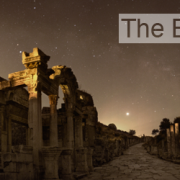There have been a few times that I thought that I was going to die. None of those incidents were heroic, so I won’t mention them here, but they were real enough. They were frightening, shocking, and in their own way, brought an undoing into my life. They reminded me of my mortality, and that death can come in a moment.
Some of those frightful experiences were due to my carelessness and negligence. At other times, the causes for my “near death experiences” came from other people. Regardless of how and when things came about, thinking that one might be dying is an unforgettable experience.
Humans have a strong urge to live. If you have ever been caught under a series of waves in the ocean, you know that feeling. You need to come up for air, but the waves keep coming, pushing you back down. You know that it is wise to not panic, and you anticipate that a break will come, and that you will be able to surface eventually. You resolve that it is best to let the waves toss you around until you can come to the surface. Fighting the waves uses up precious oxygen, and so you purpose in your mind to play the rag doll.
But the waves keep coming, and in spite of your best efforts to remain calm, the panic sets in, and the survival instinct goes into high gear. The instinct for survival is a strong one. The body does not want to die, and so the fight begins.
A similar if not same instinct exists in the heart, mind, and soul of man. Humans, at their base level, want to have their own way. They don’t want to “die to self”. Every reader here is probably convinced of that.
As a Christian, and as a pastor, I understand the command to “die to self”. I agree with the words of John the Baptist when he said, “I must decrease, but He (Jesus) must increase”. Every Christian in any kind of ministry is familiar with these words, and has begun the pursuit of learning how to die to self.
There is a kind of dying to self that we seek after and volunteer for. We deny ourselves ungodly pursuits. We say “no” to sin. We pray that we might “die daily”, and then we make conscious choices throughout the day. When faced with an opportunity for selfish gratification, we seek to take the high road. When an opportunity for revenge appears, we say a prayer and ask for a loving heart. Self denial is practiced in many ways by Christians who serve Jesus. Any Christian in ministry of any kind is familiar with these concepts, and is engaged in them to some degree, as they/we should be.
But there is another kind of dying that none of us seeks after, or ever wants to face. It comes in many different configurations, but it is a death to self that is forced upon us. It is a death that takes our breath away, undermines all self-confidence, and quickly knocks us to the ground.
It is a death to ego, a death to dreams, a death to self confidence. It is a death to hope. It comes as the sudden harvest of foolish sins we have allowed to continue. It comes through the piercing words of those whom we have laid our lives down for. It comes through tragic loss that takes place in a fallen world. It comes as a blowback from the blind spots we are ignorant of in our own lives. It comes when we are doing everything “right”. Or not…
Physical death can come incrementally, through lack of exercise, poor eating habits, etc. That kind of physical death is cumulative. It is not sudden. At other times, physical death is sudden, and completely unexpected.
The same is true in the realm of human psyche. The Christian knows to die to self, and so they do. An accumulation of small deaths to self take place voluntarily, and a degree of selflessness and Christlikeness is established. That is accepted, pursued, and volunteered for. It is anticipated, and though painful, it is “manageable”.
But there is the “other death” that seems to undo us. It comes suddenly and forcefully. It leaves us breathless, hopeless, and thinking things that are extreme and unreasonable. It throws us into an emotional downward spiral. It kills us in ways we never thought possible. It tests us to the very core of who we are in Christ.
Dying to self can never be fully accomplished if left to the one dying. We will never embrace death as much as we should, and sometimes God needs to force it upon us. A good coach will push an athlete far harder than the athlete would push himself. God “kills” His servants on a much deeper level than they would ever pursue without Him.
I (obviously) write from experience. There are times that I swear I am going to quit the ministry. I begin to make plans for my escape, and for my transitioning into “civilian life”. I will live for myself, my wife, and if anyone is lucky, they might get a bit of my time. Even in those emotional moments, I KNOW that I am wrong, but the unsought for death that I am enduring is screaming at me to take a new direction, and for that moment, I am in full agreement.
Saturday night comes, and I am 99% sure that I won’t be in the pulpit on Sunday. I plan my excuse for not being there, and console myself that “the church will be fine without me”. The current death is strong, but the Spirit is stronger, and is speaking to me. I know that eight hours of (restless) sleep can make a huge difference, and so I delay making that call to excuse myself from preaching.
Sunday morning comes, and I obediently show up. I am empty, fragile, fearful, and people-shy. I am praying that no one wants counseling before the service. The “death” has let up a bit, but I still feel like a zombie, and have zero emotion regarding sharing the eternal word of God.
During worship I sing obediently, offering up my sacrifice of praise. And then it happens. A certain lyric hits me, and the tears come. The burden is being lifted. I still don’t want to preach, but I am familiar with the process. I have been here before. I know how it will turn out.
Worship finishes, announcements are made, and now its time to greet people. Instead, I fumble through my notes, fearful to make eye contact with anyone, lest they see the dread that is in my heart.
Finally, it is what I call “show time”. I ascend the platform, open my Bible, and in faith and fear, begin to speak the truths of God. It is a strange feeling to be that empty, and yet it feels so right. There is a noticeable void of self, even though self is fighting to surface. The unneeded idiosynchrasies that sometimes sully the message are absent. The sense of humor is subdued, but not gone. There is a somber, frightful, God fearing tone that is fresh, new, unnerving, and obvious.
Providential death has come and done its work. Death has come and resurrection life has followed. That which was not searched for has become a friend. More of me has died that I didn’t realize needed dying. I have survived the “black dog” episode once again. The pastor isn’t going to quit, and the people applaud after the final “amen”.
“So then, death is working in us, but life is working in you”.
Dead men preach better.
(I’ll be in Mexico when this goes online. I’ll catch up with comments as I am able. Blessings.)
(P.S…..since I wrote this, I have returned from Mexico, where a bus ran us off the highway at 70 m.p.h.! I am banged up, but alive. Interesting P.S. for this post?)








